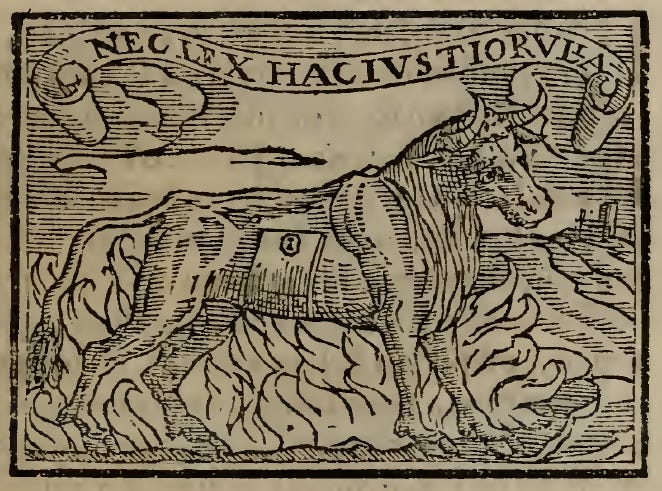Share/Ruly/Delibate : Pubis/Regular/Sample
Wurdz, shawty.
No bit of the elucidation following a dictionary entry’s lemma elicits any more stertorous snort from the (or, at least, this) inveterate leximane than that generated by a glimpse of one of the qualifiers “rare”, “obsolete”, and “archaic”. Selon qui, sparky? Language, through the azoth of the Joycean, drives the inflation of consciousness among us sapient primates that were fretted into awareness by the mindless First-Person physics of this our homeworld, and the more words you loose into the pachinko Charybdis within which that Silence and its manufacture the Logos league in emanation of the pneumatic waves-cum-particles, incoming from the nonexistent future(s), that are the Paraclete, the more you approximate the heptadic mind of one of the transtemporal cephalopods in Arrival. And who doesn’t want that? Prate not to me, therefore, of the three caitiff ascriptions above — any lexeme from Early Modern English onward is on the table. Of Cebes! Ha!
Anyway, the form of the story depending is that I within the last half-year have enlarged the list of illustrative quotations I’ve supplied to Wiktionary by 200%, which, okay, amounts to no terrific lexicographical seism, as I started from a base of one — so, three, which appear as the main hed here, grouped as headwords (in the chronological order in which they were added) and followed by their respective definitions. (But still; come on.) Now joining my earliest contribution (sometime in this decade? I can conjure no less-vague vintage for it), Theophilus Holland’s Englishing of a passage in Suetonius describing Domitian’s assassination, are examples of use fetched out of two plays, one (Histrio-Mastix (not the polemic Wm. Prynne got his ears docked for writing)) by the Jacobean joker John Marston personating the middle child, the other (The Antiquary) by the caricaturably-obscure Caroline clown (modern sense) Shackerley Marmion in the rôle of the babby. Am I inordinately pleased with myself? Yeah, for some reason.
The dramatic effusions just referred to, and about a zillion other titles from the 14th through the 17th centuries, swam, tanquam tabulata naufragii, into my ken thanks to a curious shambles of a reference work (and how it came to my attention I don’t recall) assembled but not (alas) edited by Vincent Stuckey Lean, one of the latest of the late-Victorian putterers of (mostly but not exclusively) Anglophone letters and a frequent correspondent of Sir James Murray. The five posthumously-published volumes that comprise Lean’s Collectanea wander informedly, though not always sticking to clearly concatenated pathways, through a trackless garden of English in which the chroma is even for the sad colours cranked to 11. Not least as a memento vivere to roborate the conceit that no piece of a living language can truly ever be deemed dead, chalantly recommended.
A Monition for Musk
Trump’s BFF during the first century of the Second Orange Age (i.e., from the autumn of ’24 to last summer’s sublimation of the ruinous DOGE farce into a mephitic mist of facially Musk-abeyant grift and apparently uninflectable fecklessness) is, late indications would suggest, not yet done essaying to cozen the federal government into funding his shitty fanfic version of Total Recall and otherwise just handing him money and prizes; welladay, welladay. Could he but read l’écriture vraie (he can’t), he might profit not a little by absorbing the excerpt below (it drawn from one of the multitude of books uncovered to me in the pages of the Collectanea, I should mention), abstracted from the ofttimes too priggishly pious but often enough, as here, censoriously sharp Richard Brathwaite’s Natures Embassie: or, The Wilde-Mans Measures (1621):
Perillus an excellent Artificer (being then famous for excellent inuentions) to satisfie the inhumane disposition of the tyrant Phalaris, as also in hope to be highly rewarded for his ingenious deuice: made a bull of brasse for a new kind of torment, presenting it to Phalaris, who made triall thereof by tormenting Perillus first therein. … Much was it that this curious Artizan expected, but with equall & deserued censure was he rewarded: for inglorious aimes seconded by like ends. … [S]uch … rather then they will lose the least esteeme with men of high ranke or qualitie, vse to dispence with faith, friend, and all, to plant them firmer in the affection of their Patron. … They seldome extend their temporizing houres to an accomplished age, but haue their hopes euer blasted, ere they be well bloomed: their iniurious aimes discouered, ere they be rightly leuelled: and their wishes to a tragicall period exposed, as their desires were to all goodnesse opposed. May all proiectors or state-forragers sustaine like censure, hauing their natures so reluctant or opposite to all correspondence with honour.
[Emblem from Covarrubias Orozco, Emblemas morales (Madrid, 1610), distinguished for (among divers other causes) being made reference to by Sir Thomas Browne in Christian Morals. The mote (from Ovid) is misquoted in both the emblem and the commentary (not reproduced here); it should read: Neque enim lex iustior ulla est — “There is verily not any law more just” (in this case, that which condemned the supplanted tyrant to roast within the chief terror-armature of his sadistic statecraft).]
Larval Yijing: All Hallows’ ’25
I have heretofore remarked two outcomes of the six three-penny casts whereby Yijing’s divination-by-metal modality is effected that are both, at least in my experience, not trivially uncommon. In one, the coming up of the coins in one throw as either all obverse or all reverse, the trigger for the constructing of a second hexagram (the “change”, it in this our little parlor-séance system rubricked “Mutatio”), fails to present, and the result obtained is merely a model of a static context, such that matters will remain as they are for another half-quarter; in the other, a relatively-recently-surfacing hexagram plays revenant, not necessarily but often enough returning to the stage, in what is its future, as the heir, though, discordantly, mirror, to its former station, as rather What Is than What Will Be. Welp. This instant iteration of the business for the cross-quarter divinatory operation features both outliers, the solo figure having appeared as, yes, the change in my more-or-less fall-equinox edition of ’24, so … so what? Portentous much? Where are we?
Canon Legge as ever furnishes the substrate, I as ever gender-rectify in my edit five millennia of self-styled high civilization (and fuck you if you don’t like it).
In Statu Quo
Xiaoxu/Small Restraint
indicates that there will be progress and success. Dense clouds, but no rain coming from our borders in the west.
The unitary first shows one returning and pursuing that one’s own course. What mistake should the said fall into? There will be good fortune.
The unitary second shows one reverting by attraction. There will be good fortune.
Suggested by the unitary third: the idea of a carriage, the strap beneath which has been removed, or of spouses looking on each other with averted eyes.
The bipartite fourth shows one possessed of sincerity. The danger of bloodshed is thereby averted, and that one’s apprehension dismissed. There will be no mistake.
The unitary fifth shows one possessed of sincerity drawing others to unite with that one. Rich in resources, the said makes common cause with the neighbours.
In the unitary sixth, the rain has fallen; a stay. We must value the full accumulation of virtue. But a spouse, however firm and correct that one may be, is in a position of peril — the moon approaching the full. If the superior prosecute measures, there will be evil.
Mutatio
None.




